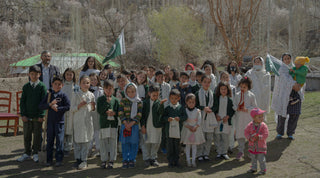Ali inherited a lush forest from his father, a thriving land covered with Russian Olive, Sea Buckthorn, and a variety of native plants spread across more than 20 kanals. This forest was more than just trees—it was a living, breathing world of its own. Many parts of it were so dense that only animals could navigate through the tangled undergrowth, carving secret pathways among the bushes.
As dusk approached, the village would come alive with the flutter and chatter of birds. Sparrows, owls, doves, mynas, magpies, and visiting seasonal birds would return to this sanctuary, seeking refuge in the thick branches. The evenings filled with their lively calls as they settled in, jostling for space among the trees. In winter, these birds would feast on the forest fruits that remained, their fallen leaves forming a soft, knee-deep carpet across the forest floor. Come spring, new green shoots would sprout from the rich soil, nourished by the seeds dropped in bird droppings and covered by layers of decayed leaves—a perfect cycle of renewal.
For years, this forest provided Ali’s family with more than just beauty. It was a dependable source of fuel wood and fresh forage for their cows, sheep, and goats. The forest’s rich bed of leaves and bird droppings was collected to fertilize their crop fields, completing a perfect loop of natural abundance.
But as Ali and his brothers grew older and earned their education from distant colleges, their way of seeing the land began to change. They no longer viewed the forest as a sacred inheritance but as an opportunity—land that could be cleared for profit. They calculated that apple orchards, apricot groves, and other fruit trees would bring greater economic return. Their father, who had spent his life tending this forest from fragile seedlings to towering trees, would quietly listen to their arguments, unable to sway them. He passed away before he could witness the irreversible change to the land he had cherished.
The forest was cut down.
In its place now stands a modern house, neat crop fields, and orderly fruit trees. The land is productive but empty of its former soul. Sparrow nests are removed regularly to keep the house clean. Birds are deliberately kept away to protect the grapes, cherries, and apples. The vibrant chorus of birds that once filled the evenings has been replaced by a heavy, lifeless silence, broken only by the occasional barking of dogs chasing away the few remaining wild animals. The forest insects that once balanced the ecosystem have been replaced by crop pests—resistant now to the very pesticides sprayed to control them.
Old villagers who visit the farmhouse stand in quiet amazement at the new development. Yet even as they admire the changes, their stories wander back to the past—to the days of hunting trips in the forest, the soothing shade of towering trees, and the nervous excitement of sneaking walnuts from the old groves.
Ali's children, growing up amid fruit orchards and concrete walls, will never know the world their grandfather built. They will never feel the cool, damp earth of the forest floor or the thrill of walking under a thick green canopy alive with birdsong. And this is what haunts Ali the most.
Now, Ali carries the weight of regret. He has come to understand that a tree is not just wood, not just shade—it is a home. Each tree he cut down was a shelter, a nesting place, a small but vital part of something much greater. He often wonders now, with quiet sadness, how many lives he unknowingly displaced, how many bird nests he destroyed, and how much of his father’s wisdom he ignored.
His regret is not just personal—it is a quiet recognition that when we break our connection with nature, we lose something that money can never replace. Ali now knows that the value of land is not just in what it can produce, but in the life it sustains.





